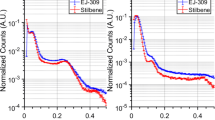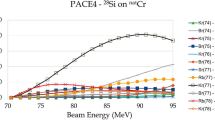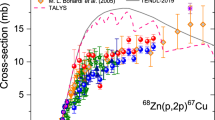Abstract
IN a recent article1 the use of two end-window Geiger counters (20th Century Geiger-Müller type EW2C) for scanning chromatograms containing iodine-131 was discussed. It was shown that using anti-coincidence techniques the background in the double-counter system was typically about 3.5 c.p.m. Furthermore, it was pointed out that significant fraction of this background arose from radioactive contaminants in the window material of the counters. The efficiency of detection for iodine-131 and Whatman No. 1 chromatography paper is about 50 per cent. Using the formula quoted in ref. 1 the total time (T) required to determine the presence of 2 µµc. with an accuracy of 10 per cent is 375 min. By carefully selecting Geiger counters, backgrounds lower than the typical one can be obtained, although it is doubtful if it is possible to do better than about 2.8 c.p.m. The above value of T would then be reduced to 316 min.
This is a preview of subscription content, access via your institution
Access options
Subscribe to this journal
Receive 51 print issues and online access
$199.00 per year
only $3.90 per issue
Buy this article
- Purchase on Springer Link
- Instant access to full article PDF
Prices may be subject to local taxes which are calculated during checkout
Similar content being viewed by others
References
Barnaby, C. F., and Plaskett, L. G., Nature, 200, 950 (1963).
Author information
Authors and Affiliations
Rights and permissions
About this article
Cite this article
BARNABY, C. Low-background Beta Counters for Iodine-131 Sources. Nature 204, 68–69 (1964). https://doi.org/10.1038/204068a0
Issue Date:
DOI: https://doi.org/10.1038/204068a0
Comments
By submitting a comment you agree to abide by our Terms and Community Guidelines. If you find something abusive or that does not comply with our terms or guidelines please flag it as inappropriate.



